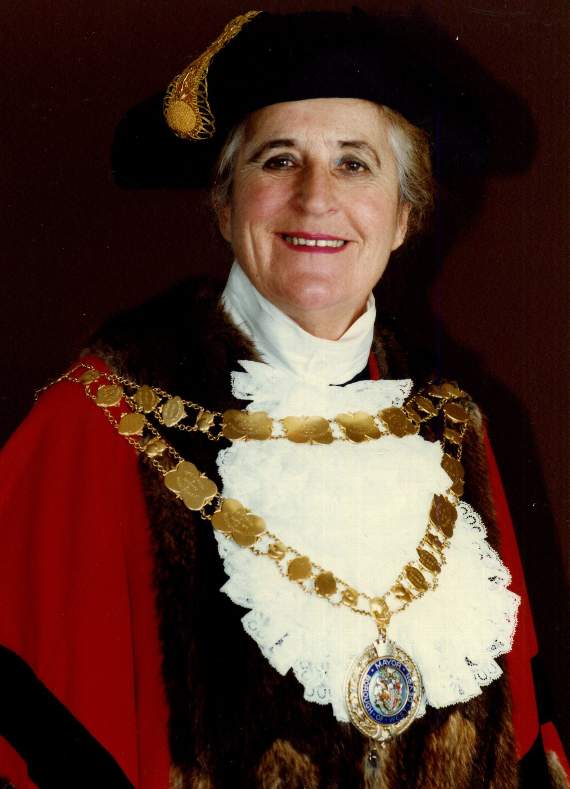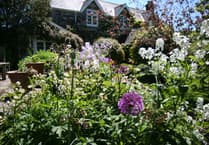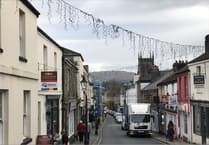THE first ever Mayor of West Devon and former borough and parish councillor Josephine ‘Jo’ Hawkins has died at the age of 93.
Jo was elected as the first mayor of West Devon in 1982-3 when the district was granted its borough status.
In the role of mayor, Jo received the royal charter, granting West Devon its borough status, from Prince Charles and Princess Diana, in Tavistock Town Hall. Jo recalled the event as her proudest day.
Her first foray into politics was in 1969 when she was elected as council member for Tamerton Foliot. The press described her as ‘the unknown housewife”. She represented the ward for 11 years. She later returned to politics to represent the Walkham ward on West Devon Borough Council.
Jo was also heavily involved in the building of the a leisure pool in Tavistock Meadows from conception to completion, securing funds from European grants and earning her place on the foundation stone which was laid by Prince Edward at the Meadowlands Leisure Pool.
Passionate about Britain’s ties with Europe, Jo was involved in twinning, both with Horrabridge and Tilly-Sur-Seulles and West Devon with German town Wesseling.
Many exchange visits and fundraising events led to lifelong friendships for Jo.
Her daughter Gillian Jeffery said: ‘ “The unknown housewife” blossomed into a fully fledged local politician, informed, hard working and committed. It became her life and she didn’t slow down until well into her eighties — she had the stamina and enthusiasm of a much younger person. Her contribution to her beloved village of Horrabridge will be missed.’
She was born in 1924 at Blandford Forum in Dorset to successful horse dealer George Hardy and his wife Helen. She had a sister, Anne, and three older brothers, Gerald, George and Walter.
Gerald was a talented national hunt jockey and rode Forbra to fourth place in the 1934 Grand National.
Jo’s childhood was perhaps an idyllic one, with three brothers to look out for her and a sister to play with in the countryside, riding, swimming, walking on the downs and playing tennis. Both sisters were enthusiastic learners and did well at school.
After school, Jo went to work in the offices of a large dairy and during the Second World War, she worked in the Post Office as a telegraphist.
After the war she met and married Alan Hawkins. He had been a sergeant in the RAF and saw service in France, Germany and Burma. He became a plumber and heating and ventilating engineer.
They converted a green single deck bus into their home and kept it in a village near Portreath, where Alan was working at RAF Portreath at the Experimental Warfare Establishment.
Later they brought their bus to Cremyll and parked it in a local boatyard. Alan’s skills were required to make and install the copper spires on two new churches in the Barbican area of Plymouth; both the Plymouth Unitarian Church, in Notte Street and Catherine Street Baptist Church were designed by the same architect and have since become listed buildings.
Jo and Alan had two children, Stewart and Gillian, and moved to a flat in Plymouth. Once there, Jo enrolled in Plymouth Art College to learn ceramics and sculpture, having her work displayed in Plymouth City Museum.
Not long after, the couple decided to buy a plot of land in Tamerton Foliot and build their own home. Working in the evenings and in their spare time, they built a red brick bungalow and were thrilled to have a proper home, though they soon realised their garden had its own house number on its own plot, and so the first was sold and a second modern house was built!
The couple then moved to Sampford Spiney on Dartmoor.
At the age of just 56, Jo’s husband Alan passed away, leaving her a widow at 53 years old. She moved to Horrabridge and threw herself into village life, becoming a parish councillor and enjoying helping her community and its environment.
She was the first to volunteer for fetes, barbecues and any other events in Horrabridge. She loved the village, opening her home for barbecues and parties and meetings.
She was lucky enough to be invited to a garden party at Buckingham Palace with her daughter Gillian and met the Queen and other members of the Royal Family.
Jo was approached by Plymouth District Magistrates Court to become a justice of the peace. She loved the role and was remembered for being firm but fair.
Once widowed, Jo and a friend who was also widowed, started to travel on holiday together, with these trips taking them to China and Russia among other places.
She died peacefully in Yelverton on April 30.
Her funeral was held on May 18 at St Mary’s Church in Sampford Spiney.


.jpeg?width=209&height=140&crop=209:145,smart&quality=75)
-with-lightning).jpeg?width=209&height=140&crop=209:145,smart&quality=75)

Comments
This article has no comments yet. Be the first to leave a comment.